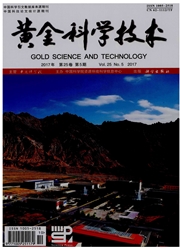

 中文摘要:
中文摘要:
作为一种环境友好的冶金技术,难处理金矿的生物预氧化工艺已经在世界各地得到了推广应用,但是生物预氧化过程中释放出的三价砷会对细菌造成伤害,导致细菌的生长受到抑制。本文采用嗜酸氧化亚铁硫杆菌(Acidithiobacillus ferrooxidans,At.f)在不同条件下进行含砷难处理金精矿生物预氧化实验,研究生物预氧化过程中砷的价态变化及其对细菌生长情况的影响。实验结果表明:在生物预氧化过程中,微生物氧化作用产生的高氧化还原电位(大于480 mV)可以使矿物溶解释放出的三价砷较快地氧化为五价砷,使其毒性减弱。在实验中发现,较低的初始矿浆浓度和较高的细菌接种量有利于产生较高氧化还原电位,使生物预氧化操作顺利启动。
 英文摘要:
英文摘要:
As an environmentally friendly technology,the biooxidation pretreatment of refractory gold ore has been applied widely all around the world.However,in the process of preliminary biooxidation,the growth of the bacteria can be inhibited by the toxicity of the released As(III).In this study,biooxidation experiment of arsenic containing gold concentrate was carried out with Acidi-thiobacillus ferrooxidans under different conditions.The variation of arsenic valence in the solution was monitored and its effect on bacterial growth was investigated.The experimental results showed that the released trivalent arsenic As(III)could be quickly oxidized to pentavalent arsenic As(V)at higher redox potential(Eh 480 mV),which was less toxic.In the experiments,it was found that lower initial pulp density and high inoculation amount were good for attaining high redox potential in a short time,and therefore were helpful to start the biooxidation process.
 同期刊论文项目
同期刊论文项目
 同项目期刊论文
同项目期刊论文
 期刊信息
期刊信息
